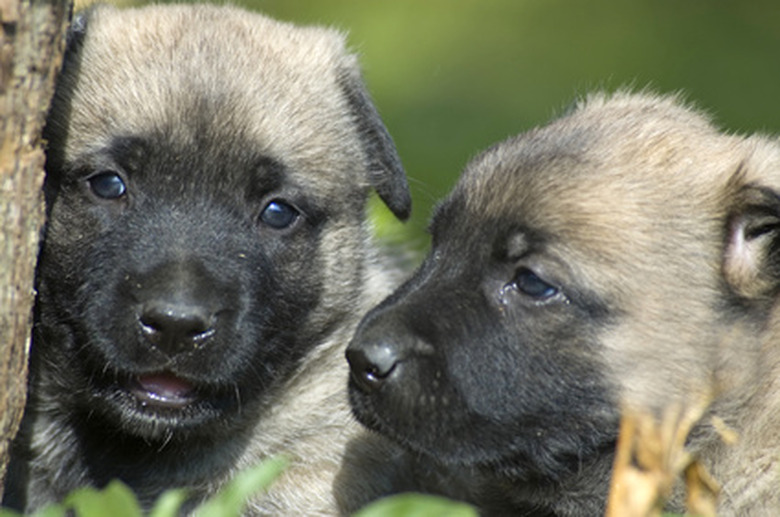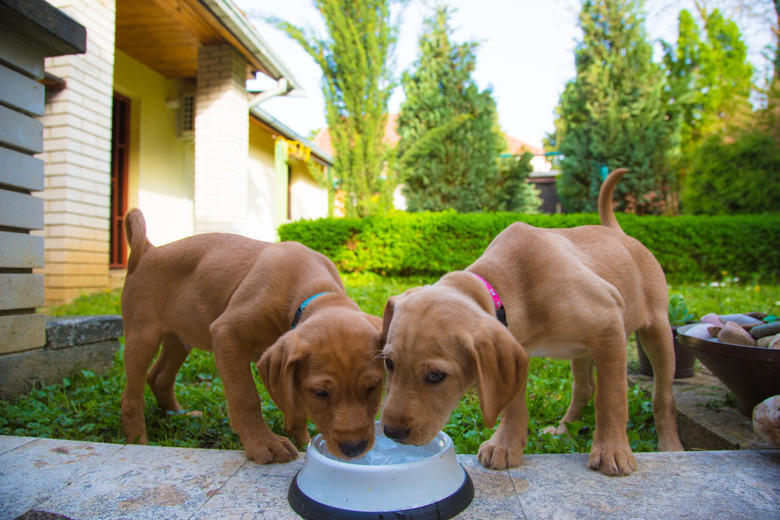Kennel Cough In Puppies: Treatment And Prevention
Newborn puppies are roly-poly, soft, and devastatingly cute. But they can also be the cause of a lot of worry, especially if they get sick. One relatively common illness in puppies is kennel cough, which can affect them anywhere from mildly to fatally. If you have newborn puppies in your care, it is imperative to know the best ways to prevent kennel cough, how to recognize early symptoms, and how your veterinarian will likely treat the infection.
What is kennel cough in puppies?
What is kennel cough in puppies?
Kennel cough is an upper respiratory tract infection in dogs. It is caused by various bacteria (such as Bordetella bronchiseptica or mycoplasma), viruses (commonly adenovirus type 2 or parainfluenza virus), or both. This illness is also known as canine infectious respiratory disease complex, or CIRDC, and canine infectious tracheobronchitis. Hallmark signs of the infection are a dry, hacking cough and a runny nose. Some dogs will also exhibit sneezing and eye discharge. Kennel cough is most easily transmitted in places where multiple dogs are in direct contact with each other, such as dog parks, boarding facilities, doggy day care, animal shelters, dog shows, the groomer, and public places that have communal water bowls for dogs..
Canine influenza, also known as "dog flu," is a separate condition than kennel cough, but like kennel cough it is a contagious disease. It's caused by the canine influenza viruses H3N2 and H3N8.
Kennel cough can take its course as a mild bug (similar to a human cold), or if it is not treated properly or the dog is already immunocompromised, it can progress to a serious health issue, such as pneumonia. Newborn puppies are particularly vulnerable to secondary infections and even death given that their immune system is immature. Contact your veterinarian right away if you think your puppy or litter of puppies is sick. The veterinarian will decide what treatments are needed. In severe cases, the puppies might need to be hospitalized.
Take heart that puppies with kennel cough generally have a good prognosis if it is caught early. Nursing newborns have the advantage of receiving vital immune-boosting milk from their mother.
Symptoms of kennel cough in puppies
Symptoms of kennel cough in puppies
Kennel cough comes with a set of clinical signs that can be uncomfortable for puppies at best and life-threatening at worst. If you notice any of the following signs, contact your veterinarian as soon as possible to get the puppies in for an examination.
- Dry, hacking, or honking cough
- Sneezing
- Eye discharge
- Nasal discharge
- Retching/gagging
- Lethargy
- Mild fever
- Inappetence/decreased nursing
Treatment for kennel cough in puppies
Treatment for kennel cough in puppies
The first and most important step in treating puppies with kennel cough is to visit your veterinarian. They will examine the puppies, perform diagnostics such as chest radiographs, and determine the best course of action.
It is not advisable to try to treat the puppies at home. While this is sometimes doable for mild cases in generally healthy adult dogs with a mature immune system (and only if your veterinarian deems it OK), newborn puppies are more likely to have a hard time fighting off an infection. They can have serious complications, including passing away, if an owner attempts to treat a case of kennel cough at home without veterinary intervention. Do not attempt to give the puppies human medication such as cough suppressants.
If the puppies are not nursing and are becoming dehydrated, it is especially crucial to contact your veterinarian right away. Puppies who are not nursing properly are at risk of deteriorating quickly. Your veterinarian will most likely want to provide the puppies with supportive care, such as subcutaneous fluids, nutritional supplementation, and nebulization. They might advise using a humidifier at home too. They may also prescribe a course of antibiotics, especially if the puppies' kennel cough is severe.
In addition, your veterinarian will advise you on whether or not to separate the puppies from other dogs in the home (this prevents the puppies from spreading the illness to other dogs) as well as how to proceed if the mother dog also has an upper respiratory tract infection.
How to prevent kennel cough in puppies
How to prevent kennel cough in puppies
Keep newborn and very young puppies with their mother but separate from all other dogs. Until the puppies are old enough to get vaccinated, they can be susceptible to a variety of transmissible diseases from other canines. If there are other dogs in the home, make sure those dogs are fully vaccinated.
Provide the puppies' mother with proper nutrition so she will be healthy enough to provide the puppies with life-sustaining milk and to pass along essential antibodies. Monitor the puppies closely to make sure that they are actually nursing, growing, and gaining weight appropriately. Consult with your veterinarian at the first signs of kennel cough in the mother or puppies. An upper respiratory tract infection or any other illness usually has a much better prognosis if caught early. If you plan on having puppies, make sure your mother dog is current on vaccines ahead of time, including the Bordetella vaccine.
Make sure to keep the area where the puppies will live very clean. Disinfect the area every few days with a clean towel and pet-safe detergent soap. A newborn's respiratory system is very sensitive, so avoid using cleaners with strong, lingering smells. Allow the area to air out before placing the puppies in that location. Put your face to the surface after the surface has dried to make sure there is not a strong odor because the puppies will be crawling on that surface.
The bottom line
The bottom line
Newborn puppies who develop kennel cough (an upper respiratory infection that can be caused by a variety of bacteria and viruses) will display symptoms such as coughing, sneezing, and a runny nose. It is extremely important to have your DVM examine puppies that display any of these signs, as their immune system is not yet fully developed. This means that even a cold that starts out mild can progress to a serious disease and even death if not treated appropriately. Treatments might include antibiotics, subcutaneous fluids, nebulization, and supplemental nutrition. Go to the veterinarian right away and do not attempt to treat puppies with suspected kennel cough at home. You can help prevent upper respiratory tract infections by practicing good hygiene and neonatal care from the time the puppies are born.


